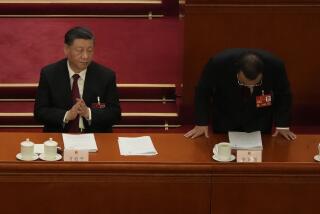8 Senior Chinese Leaders Leaving Politburo as Step to Power Shift
- Share via
BEIJING — Eight senior Chinese leaders, including the president and defense minister, are stepping down from the Communist Party’s ruling Politburo, a Beijing-controlled newspaper reported Friday.
The retirements from the 14-member Politburo imply that many of these leaders will also step down from government positions at next spring’s National People’s Congress, or Parliament.
However, in China’s political system, where prestige and personal connections count for more than formal titles, it is possible that some of the eight, such as President Yang Shangkun, 85, will continue to exercise as much power after retirement as they do now. Senior leader Deng Xiaoping, 88, for instance, continues as China’s key leader even though he holds no official post. Many observers view Yang as the country’s second-most-powerful figure.
Still, the retirements are important both as part of a process of generational succession and as the first step in a probable shift toward a more reformist lineup on the Politburo. A Communist Party Congress under way here will elect a new Central Committee on Sunday, which in turn is expected to name about 14 new people to join the six continuing members of the Politburo, bringing the total number of seats up to about 20.
The resignations were reported by the Hong Kong-based Wen Wei Po, a newspaper controlled by Beijing that is often used to release information of this nature. The eight retiring leaders will not be candidates for the new Central Committee, Wen Wei Po said.
Besides Yang, those leaving the Politburo are: Defense Minister Qin Jiwei, 77; Vice Premiers Yao Yilin, 75, and Wu Xueqian, 70; National People’s Congress Chairman Wan Li, 75; Beijing City Communist Party Secretary Li Ximing, 66; Sichuan Province Party Secretary Yang Rudai, 65, and Politburo Standing Committee member Song Ping, 75.
More to Read
Sign up for Essential California
The most important California stories and recommendations in your inbox every morning.
You may occasionally receive promotional content from the Los Angeles Times.










